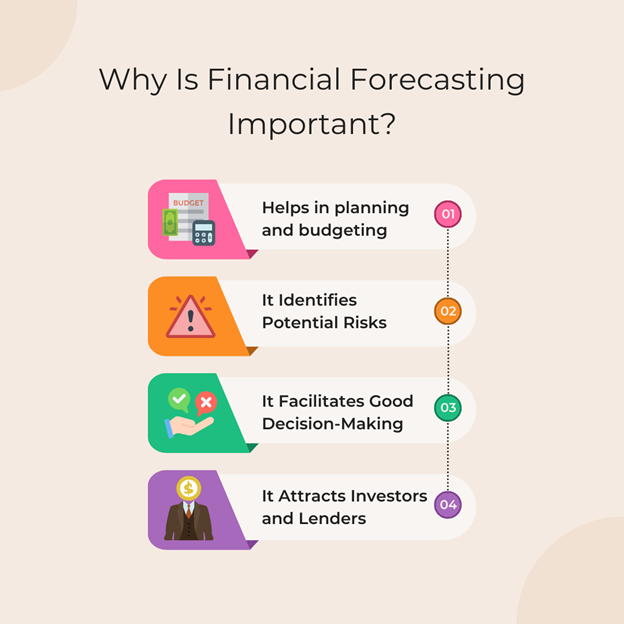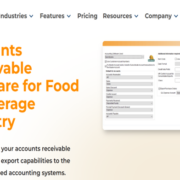The Importance of Financial Forecasting in Business Growth
Building up a business is not a one-day event. It happens via strategic planning, management, and actions. Among these tools, financial forecasting is one of the most effective strategies to ensure a business’s progress toward its goals.
It helps businesses to come up with a forecast of their future revenues, expenditures, and cash inflows and outflows in other words providing business decision-makers with forecasts that help minimize risks and maximize opportunities. For any business, big or small, new or already in operation, having a financial forecast is key to successful growth.
So in this article let me walk you through, the definition of financial forecasting, the significance of making it, the process of financial forecasting, and the utilization of financial forecasting by companies to enhance growth.
What Is Financial Forecasting?
The basic definition of financial forecasting is the prediction of a company’s future. It involves forecasting the amount of money a business will make, spend, and save based on historical data, market trends, and other types of financial analysis within a specified timeframe.
To make these forecasts more accurate and efficient, many businesses use charting software, which helps visualize trends and track financial performance over time. Short-term predictions would involve estimating the revenue for the next month, and long-term forecasts would involve a plan for the next five years.
For instance, if a business anticipates high sales during the holiday season, it can prepare accordingly, as these projections are already reflected in its predictions. It prepares by ordering more stock, hiring as many people for the period of the holiday so that they meet the sales call, and offering special promotions to increase sales.
Two Basic Types of Financial Forecasting
1. Revenue Forecasting
Revenue forecasting means the sum of money a business is going to make. This can either be through selling commodities, provision of services, or any other type of income-earning operations. A bakery would expect to sell 500 cakes in the following month with the assistance of records that have previously taken place of sales and upcoming holidays.
2. Expense Forecasting
Expense forecasting is simply the prediction made about the expenditure that a firm will incur regarding running its business, such as salaries, rents, utilities, and materials. For instance, if a manufacturing company is of the opinion that material costs are increasing, it can alter the expense forecast based on this observation.
Why Is Financial Forecasting Important?
Financial forecasting is not only a sophisticated tool for huge corporations, but it’s a necessity for businesses of all sizes. Let’s see why it plays such an important role in business growth.
1. Helps in planning and budgeting
A financial forecast serves as a business’s roadmap, outlining where funds are allocated and spent, making it possible to create a realistic budget. For example, if a company anticipates earning $100,000 in the upcoming month, it can allocate those funds toward marketing, inventory, and operations, ensuring it stays within budget.
Without forecasting, a business might overspend or underspend, hence losing opportunities or creating financial pressure. A well-articulated plan ensures that every dollar counts.
2. It Identifies Potential Risks
Uncertainty in the business, like market downturns or unforeseen expenditures, is very ordinary. Financial forecasting helps a business detect such risk factors early.
For example, if a forecast indicates a drop in revenue for the upcoming quarter, then the business can take proactive measures to cut its expenses or boost its sales with promotions. This way, businesses are prepared to deal with problems before they arise and avoid costly mistakes.
3. It Facilitates Good Decision-Making
Running a business involves making various decisions, for instance, whether to hire an employee or launch a new product. Financial forecasting gives the required information to make those decisions confidently.
For instance, if projections show steady revenue growth, the business may consider opening another location. If, however, the projection shows that there are going to be cash flow issues, the business will instead work on reducing its expenses.
4. It Attracts Investors and Lenders
Investors and lenders would love to see a well-thought business plan in respect to its future. An intensive financial forecast provides evidence of how a well-managed and ready business can be in facing success.
For example, a new venture seeking funds can use financial projections to outline its growth strategy and expense management, improving its chances of securing investment for expansion.
How Does Financial Forecasting Work?
While financial forecasting may sound like rocket science, it is still relatively easy to make. It works through a simple process:
- Collect Data: The first process is to carry out research by summarizing descriptive data which includes historic sales, costs, and profits data. This data can be extremely useful in making accurate predictions, as explained above.
- Market Trend Analysis: It helps the business organization to see and evaluate the outside environment to see the factors that may affect its performance. For example, a restaurant can find out that instead of customers eating inside the restaurant, they are placing their orders online. This trend could affect its revenue anticipation.
- Assumptions: Predictions rely on assumptions about future conditions. These assumptions should be reasonable and well-founded on empirical theory and the data in possession. For instance, when developing a budget for the coming year, a business forecasts its sales by 5% basing it on the market trends and customers.
- Create Financial Models: A financial model usually is created on the basis of computer programs, spreadsheets or other special applications. Many organizations use dedicated financial modeling software to compute predictions. These models give out results by means of history, assumptions, and trends.
- Review and Adjust: However, this does not mean that the forecast is indelibly carved in stone. Accordingly, businesses should verify it and use it as a work-in-progress at least for the matters under investigation as more information is gathered. This serves to keep the forecast credible so the projections done in the future are as accurate as possible.
Benefits of Financial Forecasting to Business Growth
Financial forecasting offers many advantages that can help a business flourish. Let’s take a look at some of the most significant benefits:
Better Resource Allocation
With a clear forecast, businesses can make informed decisions about resource allocation. For example, a company anticipating high demand for a specific product may choose to increase inventory or hire additional staff to meet that demand.
Improvement of Cash Flow Management
Cash flow is the lifeblood of every business. It allows a firm to predict cash flow and therefore set a plan when they will be in a low cash flow situation. For instance, a company can take loans or spend less during some slow seasons so that it does not go out of cash.
Goal setting
Financial forecasting enables companies to set goals that are achievable and realistic. For instance, a company can target 10% revenue growth based on its forecast. The clear goals help guide and motivate the entire team.
Improved Competitive Advantage
With the knowledge and staying ahead of the curve regarding challenges and opportunities, businesses are in a position to outsmart their competitors. Financial forecasting places a business at an advantage because it acts proactively rather than reactively in order to outdo the market.
Greater Confidence
A good and well-prepared forecast boosts the confidence of a business owner, employees, and stakeholders. With everyone in the know of what the financial plan is, then everyone can better work toward success.
Effective Financial Forecasting Tips
These are the practices a business can adopt to enhance its financial forecasting:
- Be Realistic: Actual data and avoid over-optimistic assumptions. Better to err on the side of caution than overestimate.
- Revisit Forecasts Frequently: Businesses should review their forecasts at least once a quarter to ensure they are up-to-date with current information.
- Use Technology: More tools include accounting software and forecasting apps, thus making it easier to work out and get correct forecasts.
- Best-Worst Cases: Use different tools to create multiple forecasts on best-case, worst-case, and average scenarios. This is helpful to get your business ready to face any situation.
- Involvement of Experts: Such types of accounts or financial advisors can be quite helpful and assist the person in getting closer to an accurate forecast.
Conclusion
Financial forecasting is a wonderful tool for business planning, growth, and success. It provides insights into decision-making, resource allocation, and risk management. Even with its challenges, the benefits it offers are so much greater than these if executed correctly.
By collecting accurate data, using reliable tools, and updating forecasts regularly, businesses can unlock their full potential and achieve long-term growth. Whether you run a small business or a large corporation, financial forecasting is essential for achieving success.
FAQs
- What is the main purpose of financial forecasting?
It predicts future financial performance and helps in making informed decisions for businesses.
- How can businesses make their financial forecasts more accurate?
Businesses can improve the accuracy of financial forecasts by using reliable data, involving experts, and regularly updating their forecasts.
- Can financial forecasting help during uncertain times?
Yes, it can help in uncertain times. It does help businesses prepare for uncertainties by pointing out possible risks and planning contingencies.




